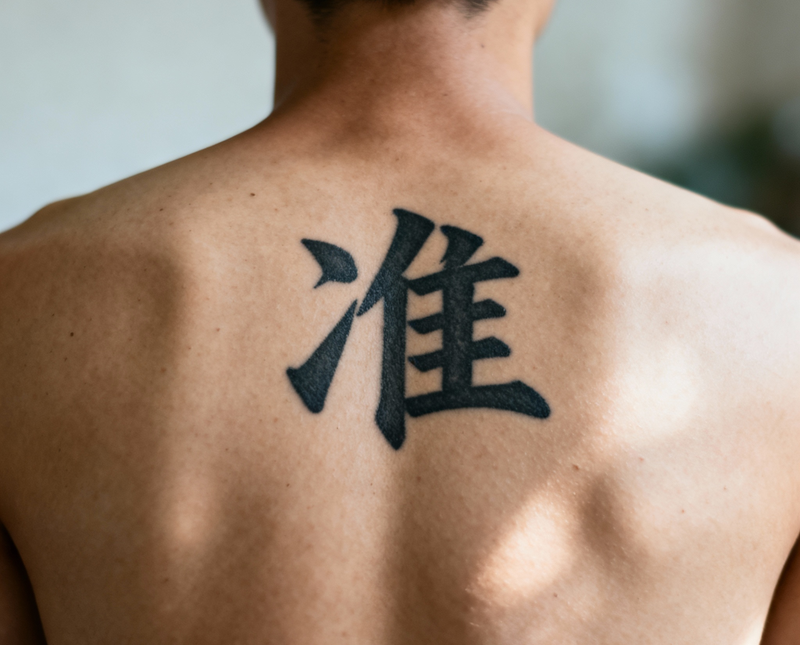
1. Direct Meaning and Breakdown of the Kanji "准" (Jun)
The kanji 准 carries a nuanced meaning related to standards, approval, and semi-official status.
Core Meaning: To approve, to permit; quasi-, semi-; standard, criterion.
Keyword: Conformity to a standard, granting permission, or a "near-equivalent" status.
Pronunciation:
ジュン (Jun): The on'yomi (Sino-Japanese reading).
Etymological Breakdown:
The character 准 is composed of two parts:
冫 (Nisui - "ice" radical): In this context, this radical is a variant of 水 (mizu, "water"). It symbolizes a level surface, like still water, which is used as a reference or standard. This is the core conceptual root of the character.
隹 (Sui - "short-tailed bird"): This component is a pictograph of a bird.
The most compelling interpretation is that 准 depicts a "bird flying level with the water's surface." This image perfectly captures the idea of using a stable, level standard (the water) as a reference point. From this, the meanings of "approval" (meeting the standard) and "quasi-" (being aligned or equivalent to the standard) are derived.
Common Usage in Japanese:
This kanji is used in a variety of formal and everyday contexts:
準備 (Junbi): Preparation, arrangements (to make things conform to a plan/standard).
基準 (Kijun): Standard, basis, criterion.
準決勝 (Junkesshō): Semi-final (a "quasi-final" match).
批准 (Hijun): Ratification, official approval (of a treaty).
准教授 (Junjukyō): Associate Professor (a rank below full professor).
2. "准" as a Tattoo: Meanings and Interpretations
As a tattoo, "准" is an intellectual, structured, and forward-looking choice. It speaks to themes of preparation, personal standards, and potential.
Positive and Profound Meanings:
A Philosophy of Preparation and Readiness: Drawing from 準備 (Junbi - preparation), this tattoo symbolizes a belief that "success favors the prepared mind." It represents a proactive approach to life, a commitment to planning, and the discipline to be ready for opportunities and challenges. It's a mark of the strategist and the diligent planner.
Living by a Personal Code: The tattoo can represent one's commitment to their own internal 基準 (Kijun - standard or principle). It signifies living a life of integrity, self-discipline, and quality, using one's own moral compass as the "level surface" to guide actions.
The State of Potential and "Becoming": With its meaning of "quasi-" or "semi-", "准" can beautifully represent a state of potential. It signifies being on the cusp of achievement, fully equipped and aligned but not yet at the final goal. It is a celebration of the journey and the promise of what is to come.
Self-Approval and Authorization: It can serve as a symbol of giving oneself permission—to pursue a dream, to change, or to be who you truly are. It's about internally "ratifying" your own choices and path in life.
Potential Considerations:
Intellectual and Subtle: Its meaning is not as visceral as "love" or "strength." It is a conceptual symbol whose power is derived from personal interpretation. The wearer should be comfortable with its nuanced nature.
Formal Connotation: Many of its uses are in formal or bureaucratic contexts (approval, standards). The poetic meaning must be intentionally drawn out by the wearer.
3. Design and Styling Suggestions
The design for a "准" tattoo should reflect its meaning of structure and alignment.
Calligraphy Style: A clean, balanced, and precise script (like 楷書 Kaisho) would be ideal to reflect the character's connection to standards and clarity.
Incorporating Imagery:
A level or ruler integrated with the character.
The kanji placed on a horizon line or a still body of water, directly referencing its etymology.
A bird in flight near the character, reinforcing the original pictographic meaning.
Imagery of a blueprint or a key, symbolizing preparation and authorization.
Minimalist Style: A simple, clean design can be very effective, representing the clarity and focus of a well-defined standard or goal.
Placement: Its structure works well on the forearm (a place for action and preparation), the wrist, or the ankle.
Summary
| Aspect | Explanation |
|---|---|
| Kanji | 准 |
| Pronunciation | Jun |
| Core Meaning | To approve; quasi-; standard. |
| Tattoo Meaning | Preparation, Personal Standards, Potential, Self-Authorization. |
| Suitability | A sophisticated and thoughtful choice for planners, strategists, and anyone who values living by a personal code and believes in the power of preparation and potential. |
Final Advice:
准 is a tattoo for the architect of one's own life. It is for those who believe in building a future through careful preparation, who hold themselves to a high internal standard, and who see themselves as being in a constant, purposeful state of "becoming." If you are a person who finds power in planning, integrity, and the promise of your own potential, this kanji can be a deeply meaningful and unique mark.